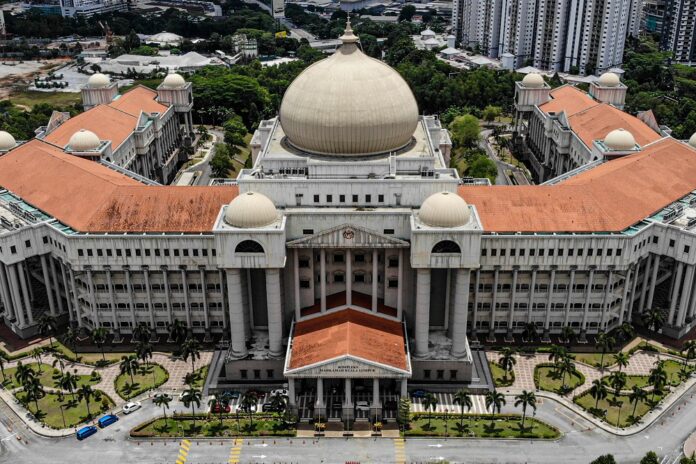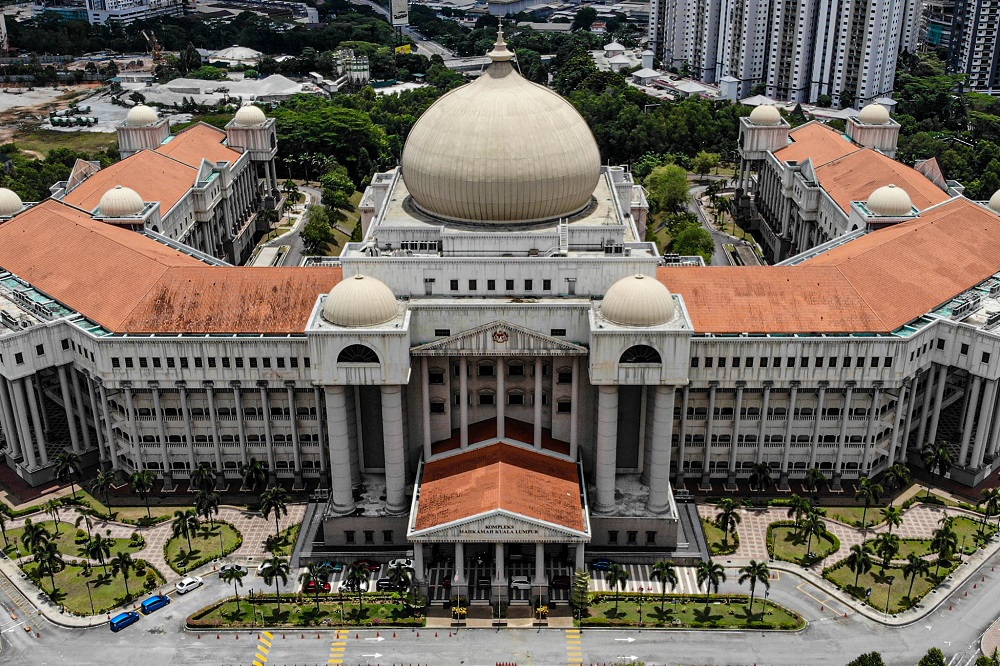Subscribe to our Telegram channel for the latest updates on news you need to know.
KUALA LUMPUR, March 19 ― The long drawn-out controversy over the use of the word “Allah” in Christian publications could have been resolved if the Malaysian government had fully implemented its 10-point Solution in 2011 and dropped its 1986 ban on such use, the High Court said in its ruling in a Sarawakian Bumiputera Christian’s case.
In this particular court case, Bahasa Malaysia-speaking Sarawakian native Jill Ireland Lawrence Bill of the Melanau tribe had filed a court challenge against the home minister and the Malaysian government, after eight educational compact discs ― containing the word “Allah” in the titles ―- for her personal use were seized by the government.
Jill Ireland had in her court case sought for Constitutional reliefs, including a declaration that the 1986 directive ― issued by the Home Ministry and which was used by the ministry to justify the seizure of her eight CDs ― was unconstitutional and unlawful.
While some Muslims in Malaysia believe “Allah”, the Arabic word for God, to be exclusive to Islam, it was adopted into the national language generations ago and used throughout by Malay-speaking Christians in the country, especially those living in Sabah and Sarawak.
The word is also part of terms referring to God in the indigenous languages of tribes in east Malaysia such as the Iban, Bidayuh, Lun Bawang, Lun Dayeh and Kelabit.
About the 1986 government directive
In the full grounds of the High Court’s March 10 judgment that was released this week, Justice Datuk Nor Bee Ariffin examined the government’s 1986 written directive which had banned the use of four words ― including “Allah” ― in Christian publications.
The judge noted the government’s position in the court case that the 1986 directive was the then Cabinet’s decision which related to the government’s policy at that time to “avoid any confusion among the Muslims and Christian community which is likely to be prejudicial to public order and creating religious sensitivity amongst the Malaysians”.
About the 10-point solution
While ultimately finding the 1986 directive to be unlawful and unconstitutional due to reasons such as the home minister acting beyond his legal powers to issue the ban, the judge had also explored the 10-point solution that was provided by the Malaysian government in 2011 to the Christian community and which lawyers had raised during the High Court hearing of Jill Ireland’s case.
The judge was referring to the 10-point solution which was a collective decision by the Cabinet and which was announced on April 2, 2011, and set out in full by then-prime minister Datuk Seri Najib Razak in his April 11, 2011 letter to the Christian Federation of Malaysia.
The judge then summed up the 10-point solution as having “demonstrated the Cabinet’s acceptance and acknowledgment that the usage of the word ‘Allah’ is never an issue in Sabah and Sarawak and the Christians are allowed to use the word in the two states without restriction.”
The judge also highlighted that the 10-point solution had not attached any conditions to the importation and local printing of the Bible in all languages ― including Bahasa Malaysia, Bahasa Indonesia and indigenous languages ― in Sabah and Sarawak in recognition of the large Christian community in the two states.
At the same time, when it comes to Peninsular Malaysia and taking into account the interest of the larger Muslim community there, the 10-point solution required the printing of the words “Christian publication” and the “cross” sign on the front covers of Bibles in Bahasa Malaysia or Bahasa Indonesia that are imported or printed.
“By doing this, one will not be confused that this is a Christian publication,” the judge said when touching on the Cabinet’s solution of the labelling of Bibles in such languages when it comes to Peninsular Malaysia.
“I have reason to believe, premised on the submissions of both parties, that the 10 Point Solution is an all encompassing religious tolerance initiated by the Cabinet that may provide the solution to end the long standing religious controversy as there seems to me to be a consensus between the parties in resolving rather than entering into religious debates and polemic on the use of the word ‘Allah’,” the judge said in her 96-page judgment that was sighted by Malay Mail, referring to the submissions or arguments provided in court by lawyers who represented those involved in Jill Ireland’s case.
The judge, however, indicated that the then-federal government had failed to give full effect to the 10-point solution when it was announced in 2011, as it did not retract the 1986 government directive.
The 1986 directive had put a total ban on the word “Allah” in Christian publications, unlike the 2011 solution which allowed Christian publications with the word “Allah” for the Christian community’s use based on location-specific conditions.
“However, despite the strong commitment shown by the Cabinet, the impugned directive was allowed to remain and has never been withdrawn till to date.
“Even after nearly a decade following its announcement, the uncertainty continues as to whether the 10 Point Solution would ever be effectively implemented.
“If the Cabinet had withdrawn the impugned directive when the announcement on the 10 Point Solution was made, there would really be no serious dispute before this court anymore,” the judge said, referring to Jill Ireland’s court matter.
Malay Mail’s checks of the 10-point solution in Najib’s 2011 letter to the local Christian community showed the Cabinet’s collective decision as also allowing the importing and local printing of Bibles in all languages including Bahasa Malaysia, Bahasa Indonesia, and the indigenous languages of Sabah and Sarawak such as Iban, Kadazan-Dusun and Lun Bawang, as well as the Cabinet’s decision that there should be no restrictions for people bringing along their Bibles and Christian materials when travelling between Sabah and Sarawak and Peninsular Malaysia in recognition that many travel between such locations.
Also as part of the 10-point solution, the Home Ministry’s secretary-general had issued a directive in the form of a memorandum dated April 8, 2011 to direct all civil servants to comply with the Cabinet decision, Malay Mail’s checks showed.
Public order not threatened in allowing Christians’ use
In the same High Court judgment released this week, Nor Bee indicated that the 1986 directive remains unlawful even after the 10-point solution was introduced, saying: “The 10 Point Solution certainly cannot remedy the illegality of the impugned directive.”
Saying that the 10-point solution has no force of law, the judge said the relevance of this 2011 Cabinet decision to Jill Ireland’s case was only to show that the 10-point solution did not come about because of any threats to public order.
Citing the same 2011 letter by then-prime minister Najib which outlined the 10-point solution, the judge noted that the Cabinet decision was instead made due to the government’s concern over the Home Ministry’s officers’ act then of impounding Bibles in Bahasa Malaysia or Bahasa Indonesia, which the letter said had “triggered concerns and tensions within the country” and which had to be urgently addressed.
“There could not be any issue of public order or threat to public order if the Cabinet alone that have access to the necessary information on national security, have taken a much more liberal approach in manning the religious issues compared to the position previously taken as demonstrated in P.U (A) 134/1982,” the judge said when noting the 10-point solution as showing that there was no threat to public order.
PU (A) 134/1982 refers to a gazetted government order made by the Home Ministry in the year 1982 to prohibit the printing, publication or possession of Bibles in Bahasa Indonesia except when used in churches by Christians.
Among other things, the judge concluded that the available evidence as a whole showed that the government’s reliance on the issue of “public order” to justify the issuing of the 1986 government directive was irrational.
Earlier in the same judgment, the judge had noted that the government had also failed to provide any evidence to back its claim that the 1986 government directive was needed to avoid alleged confusion and “misunderstanding” if the common word “Allah” was used by both the Muslim and Christian communities.
But even before ruling that the 1986 government directive to ban the use of the word “Allah” in Christian publications could not be justified by the reasons of preventing alleged confusion or misunderstanding that would allegedly disrupt public order, the judge had already listed out reasons why the 1986 directive was unlawful and unconstitutional.
This included reasons such as the home minister not having powers under the Printing Presses and Publications Act 1984 to issue the 1986 directive, and as the 1986 directive did not have statutory backing and was in conflict with the 1982 gazetted government order.
Among other things, the judge also highlighted how the 1986 directive by the Home Ministry ― which placed a total ban on the word “Allah” in Christian publications ― had changed the Cabinet’s May 1986 policy decision to only place a conditional ban on such usage.
The Cabinet had decided that the word could be used in Christian publications if Untuk Agama Kristian was specified on the publication’s cover page.
Other than declaring the government directive issued by the Home Ministry’s publication control’s division via a circular dated December 5, 1986 as unlawful and unconstitutional, the High Court in the same March 10 judgment also granted two constitutional declarations sought by Jill Ireland.
This included a declaration that it is Jill Ireland’s constitutional right under the Federal Constitution’s Article 3, 8, 11 and 12 to import the publications ― in the form of the eight CDs for her personal use ― in exercise of her rights to practise religion and right to education.
The remaining order was a declaration under the Federal Constitution’s Article 8 that Jill Ireland is guaranteed equality of all persons before the law and is protected from discrimination against citizens on the grounds of religion in the administration of the law ― specifically the Printing Presses and Publications Act 1984 and Customs Act 1967.
Following the High Court’s decision, the government and the home minister have since filed an appeal to the Court of Appeal.
On March 18, former minister Baru Bian disclosed that Jill Ireland’s court case could have been resolved out of court in the recent two years if the government had adopted a proposal to use an administrative resolution to amend the 1986 directive to incorporate the 10-point solution.
_10032021.jpg)



